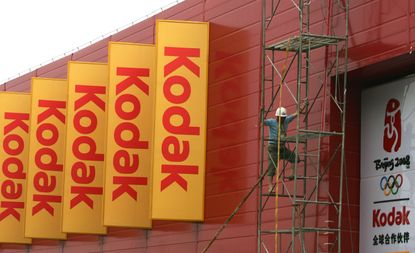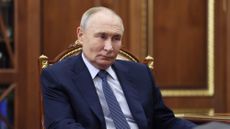The daily business briefing: January 10, 2018
Toyota and Mazda pick Alabama for their new factory's site, Kodak shares soar after it announces cryptocurrency plans, and more

- 1. Toyota and Mazda pick Alabama as site for new joint factory
- 2. Eastman Kodak shares soar after it announces plan for its own cryptocurrency
- 3. U.S. stock futures pull back after string of records
- 4. Judge temporarily blocks Trump effort to end DACA protections
- 5. India eases rules on foreign investment in bid to boost growth

1. Toyota and Mazda pick Alabama as site for new joint factory
Toyota and Mazda have chosen Alabama as the winner in a multi-state contest for a joint car factory worth $1.6 billion, Bloomberg and Reuters reported Tuesday, citing sources familiar with the negotiations. Alabama reportedly edged out North Carolina to get the plant after the Japanese sifted through proposals for months. Mazda and Toyota planned to announce the decision Wednesday in Montgomery, Alabama's capital. They plan to open the shared factory in 2021. It will employ up to 4,000 people and produce about 300,000 vehicles a year. It will be the first new auto assembly plant announced under President Trump, who has pressured manufacturers to create jobs in the U.S. by building more plants in the U.S. for cars to be sold here.
2. Eastman Kodak shares soar after it announces plan for its own cryptocurrency
Eastman Kodak shares jumped by nearly 120 percent on Tuesday after the photo firm said it planned to mint its own cryptocurrency, the KodakCoin. The move is part of a blockchain-based initiative to help photographers control image rights. At the CES tech show in Las Vegas, Kodak also outlined plans to install rows of Bitcoin mining rigs at its Rochester, New York, headquarters, making it the latest company to make a move into blockchain activity. "This is a phenomenon we saw back during the dot com days in the late 1990s where traditional companies would mention some kind of internet strategy and their stock price would jump up," said Garrick Hileman from the University of Cambridge.
Subscribe to The Week
Escape your echo chamber. Get the facts behind the news, plus analysis from multiple perspectives.

Sign up for The Week's Free Newsletters
From our morning news briefing to a weekly Good News Newsletter, get the best of The Week delivered directly to your inbox.
From our morning news briefing to a weekly Good News Newsletter, get the best of The Week delivered directly to your inbox.
3. U.S. stock futures pull back after string of records
U.S. stock futures dropped early Wednesday in apparent profit-taking following a series of record closes in 2018, including the most records in a new year for the S&P 500 since 1964. Futures for the Dow Jones Industrial Average and the S&P 500 fell by 0.5 percent. Futures for the Nasdaq-100 dropped by 0.7 percent. Analysts said the pullback was just a pause in the rally. All three main U.S. stock indexes closed at record highs on Tuesday, with a lift from health care and bank stocks. The Dow led the way, rising by 0.4 percent. The S&P 500 edged up by 0.13 percent, while the tech-heavy Nasdaq Composite gained 0.09 percent.
4. Judge temporarily blocks Trump effort to end DACA protections
A federal judge late Tuesday temporarily blocked the Trump administration's effort to end the Deferred Action for Childhood Arrivals (DACA) program, which has let more than 700,000 undocumented immigrants brought to the U.S. as children stay in the country and work. U.S. District Judge William Alsup granted a request by California and other plaintiffs to delay President Trump's decision to end the program while lawsuits work their way through the courts. Alsup said the plaintiffs had shown that young immigrants were otherwise "likely to suffer serious, irreparable harm." The ruling came as Democrats and Republicans debate giving the immigrants a way to stay. The Justice Department called the program, implemented by former President Barack Obama in 2012, an "an unlawful circumvention of Congress."
5. India eases rules on foreign investment in bid to boost growth
Indian Prime Minister Narendra Modi on Wednesday eased restrictions on foreign investment in retail and airlines in an effort to revive economic growth in Asia's third biggest economy. Foreign airlines now can buy up to 49 percent of money-losing state carrier Air India. Single-brand retailers and builders will be able to do business in India without approval from the federal government, and without local partners. "By increasing the limits you are sending out a signal that you are moving in the direction of opening up the Indian economy to foreign investment," said Madan Sabnavis, chief economist at Care Ratings Ltd. "How much actual investment comes depends on other conditions in the market."
Sign up for Today's Best Articles in your inbox
A free daily email with the biggest news stories of the day – and the best features from TheWeek.com
Harold Maass is a contributing editor at The Week. He has been writing for The Week since the 2001 debut of the U.S. print edition and served as editor of TheWeek.com when it launched in 2008. Harold started his career as a newspaper reporter in South Florida and Haiti. He has previously worked for a variety of news outlets, including The Miami Herald, ABC News and Fox News, and for several years wrote a daily roundup of financial news for The Week and Yahoo Finance.
-
 Today's political cartoons - December 22, 2024
Today's political cartoons - December 22, 2024Cartoons Sunday's cartoons - the long and short of it, trigger finger, and more
By The Week US Published
-
 5 hilariously spirited cartoons about the spirit of Christmas
5 hilariously spirited cartoons about the spirit of ChristmasCartoons Artists take on excuses, pardons, and more
By The Week US Published
-
 Inside the house of Assad
Inside the house of AssadThe Explainer Bashar al-Assad and his father, Hafez, ruled Syria for more than half a century but how did one family achieve and maintain power?
By The Week UK Published
-
 Why Assad fell so fast
Why Assad fell so fastThe Explainer The newly liberated Syria is in an incredibly precarious position, but it's too soon to succumb to defeatist gloom
By The Week UK Published
-
 Romania's election rerun
Romania's election rerunThe Explainer Shock result of presidential election has been annulled following allegations of Russian interference
By Sorcha Bradley, The Week UK Published
-
 Russia's shadow war in Europe
Russia's shadow war in EuropeTalking Point Steering clear of open conflict, Moscow is slowly ratcheting up the pressure on Nato rivals to see what it can get away with.
By The Week UK Published
-
 Cutting cables: the war being waged under the sea
Cutting cables: the war being waged under the seaIn the Spotlight Two undersea cables were cut in the Baltic sea, sparking concern for the global network
By The Week UK Published
-
 The nuclear threat: is Vladimir Putin bluffing?
The nuclear threat: is Vladimir Putin bluffing?Talking Point Kremlin's newest ballistic missile has some worried for Nato nations
By The Week UK Published
-
 Russia vows retaliation for Ukrainian missile strikes
Russia vows retaliation for Ukrainian missile strikesSpeed Read Ukraine's forces have been using U.S.-supplied, long-range ATCMS missiles to hit Russia
By Arion McNicoll, The Week UK Published
-
 Has the Taliban banned women from speaking?
Has the Taliban banned women from speaking?Today's Big Question 'Rambling' message about 'bizarre' restriction joins series of recent decrees that amount to silencing of Afghanistan's women
By Harriet Marsden, The Week UK Published
-
 Cuba's energy crisis
Cuba's energy crisisThe Explainer Already beset by a host of issues, the island nation is struggling with nationwide blackouts
By Rebekah Evans, The Week UK Published